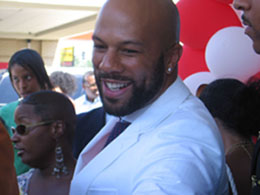Bank of America comes to West Englewood
La Risa Lynch of The Citizen
Published: August 8, 2006
The grand opening of West Englewood’s first new full-service bank in 50 years took on a red-carpet-like atmosphere.
Political dignitaries including Congressman Bobby Rush (D-1), State Senator Jacqueline Collins (D-16), State Rep. Mary Flowers (D-31), Ald. Latasha Thomas (17) and even hip hop star Common all made appearances to welcome Bank of America to its new home at 69th and Ashland Ave.
But for Thomas, who has made revitalization of 69th street a priority, the celebration marked a turning point for the area, which suffered from years of disinvestment.
“Eight years ago on 69th street we had plenty of vacant lots, abandoned buildings, social services were gone. The only thing we had were stores with no fresh fruits, no fresh foods, and no meats – fresh meats at least,” Thomas said. “Currency exchanges were the number one way we got our money and paid our bills.”
All that has changed now with the redevelopment of a former Chicago Transit Authority bus barn into a seven acre retail strip anchored by a Food 4 Less grocery store on one end and Bank of America at the other.
“Social resources are back,” said Thomas, who noted that more than $100 million have been sunk into 69th street in new developments such as the Cook County Medical center in 2002, the Wheeler House, a senior residential building in 2001 and the soon to open Salvation Army’s $12 million Red Shields Center at 69th & Sangamon.
“Residential development is up. Commercial development is back. We now have a better way to save, spend; pay our bills with our money. We are pleased…that Bank of America is in our community,” Thomas added.
Bank of America is glad to be part of the 69th Street redevelopment and the first new bank Englewood has had in 50 years, said its Illinois President John Brennan. The branch is one of 60 banking centers the financial institution plans to open by the year’s end.
“To be able to provide leadership around this is something we are very comfortable doing as an institution,” Brennan said. “We are willing to take the first step, and we think this is good business to make the investment.”
The bank has already made inroads in Englewood. It has partnered with Rebirth of Englewood, a local community development group to provide mortgages for 500 new homes in the community.
“If we are going to be a player in this market; if we are going to be a partner is this market (and) benefit from this market, we got to give something back,” he explained.
As part of the grand opening, Bank of America officials donated $35,000 to St. Sabina’s community development organization, the Beloved Community as well as $20,000 to the Chicago’s Urban League’s Teen REACH Music Program.
Father Michael Pfleger, St. Sabina Church’s pastor, called Bank of America’s investment into the community a win-win situation. He noted that the bank hired minorities to work not only as employees, but also on the building’s construction. About 50 percent of the construction workforce was African-American, he noted.
“That is how every project should be on the south side of Chicago,” Pfleger said. “Today’s a win. It’s a win for Englewood. It’s a win for Bank of America, and it is a win for doing the right thing in the neighborhood.”
Corporations can only do so much, said Common, who hosted the debut of Urban Definition, a performance group from the Urban League’s Teem REACH program. The program introduces students ages 14-17 to careers in the music industry. Part of their project was to produce and release a CD. The group performed their CD’s tunes during the grand opening event.

Chicago's own, Common
Photo: Linda Johnson
While the bank has reached out to the Black community, Common said, “It is time for us to make changes ourselves. For us to reach inside our own souls and spirits to do the type of things we need to change our community.”
While Rush applauded Bank of America’s financial contributions, he also urged the bank to live up to the Community Reinvestment Act. Passed in 1977, the CRA mandates that banking institutions meet the credit needs of low-income and minority communities in which they operate.
“We want banks to finance businesses that create jobs in our community,” Rush said. “We want you to make sure that you work with all the community organizations to make sure we get our fair share of commercial loans not just residential loans.”
That type of investment, he explained, means the difference in a safe, viable and livable community from an impoverished one.
Patricia Townsend, a 30-year Englewood resident, has high hopes for 69th street. She remembers the old CTA bus barn. And while bad areas still pocket Englewood, Townsend said she has noticed changes. She said people are taking care of their properties more, storefronts are cleaner and vacant buildings are being rehabbed.
“It is starting to build up,” she said. “Hopefully this would make a difference too (and) give people more jobs.”
Posted in Business, Housing, Economic Development